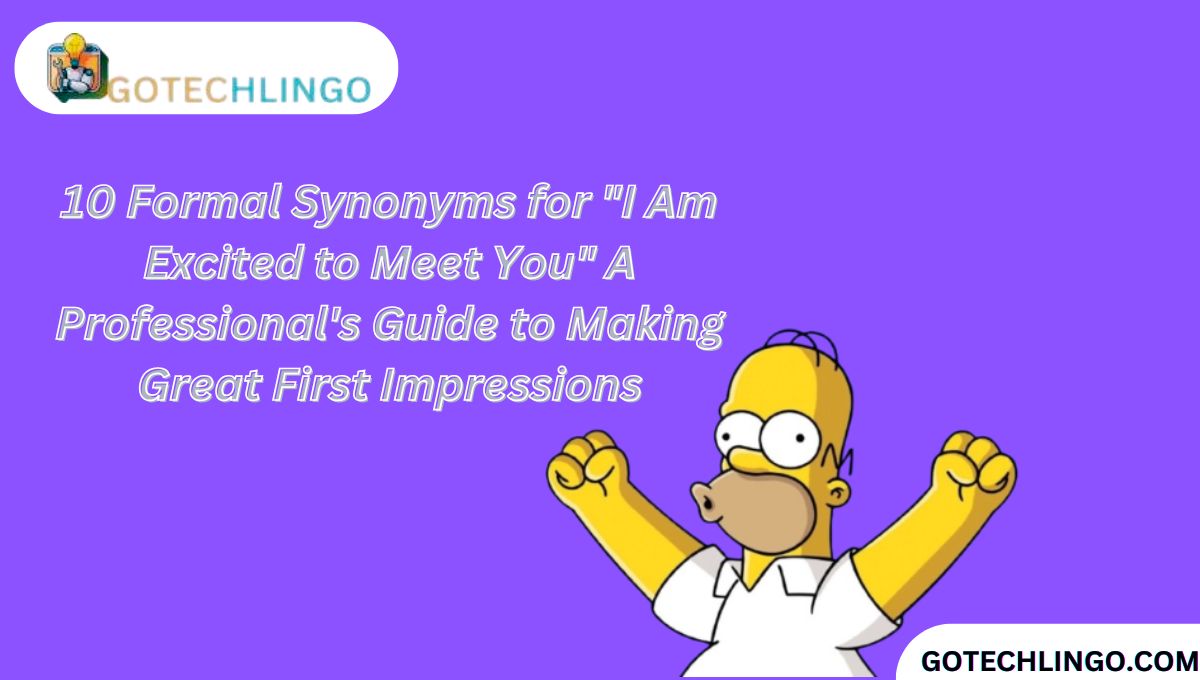In today’s interconnected professional world making a stellar first impression has never been more crucial. Whether you’re drafting an email to a potential client, preparing for a job interview, or networking with industry peers,
It expressing your enthusiasm appropriately can make all the difference. Let’s explore sophisticated alternatives to the common phrase “I am excited to meet you” that will help you stand out whilst maintaining professionalism.
Main Points
Before we dive into specific expressions, let’s understand why varying our language matters:
- First impressions last: Research shows that people form lasting opinions within the first 7 seconds of meeting
- Professional tone: Your choice of words reflects your level of sophistication and business acumen
- Cultural sensitivity: Different contexts require different levels of formality
- Memorability: Unique expressions help you stand out in professional settings
Thrilled to Connect
When you want to convey genuine enthusiasm whilst maintaining professionalism, “thrilled to connect” serves as an excellent alternative. This phrase appears like a bridge between formal and friendly communication, making it perfect for:
- LinkedIn connections
- Business networking events
- Professional conferences
- Initial client meetings
“The way you express enthusiasm can make or break a professional relationship.” – Harvard Business Review
13 Other Ways to Say “I Understand”
Looking Forward to Our Meeting
This classic expression has stood the test of time because it strikes the perfect balance. It looks like a formal acknowledgment while conveying genuine interest. Here’s when to use it:
| Context | Appropriateness Level |
| Job Interviews | ★★★★★ |
| Client Meetings | ★★★★★ |
| Casual Networking | ★★★ |
| Social Events | ★★ |
Can’t Wait to Meet You
Though slightly more casual, this phrase can be appropriate in certain professional contexts. It seems synonymous with enthusiasm while maintaining authenticity. Best used when:
- You’ve already established initial rapport
- The industry culture is more relaxed
- You’re connecting with peers rather than superiors
- The communication channel is less formal
Eager to Get Acquainted

This formal synonym appears like a perfect choice for more traditional business settings. It conveys professional enthusiasm while maintaining appropriate distance. Consider these variations:
- Eager to make your acquaintance
- Looking forward to getting acquainted
- Anticipating our acquaintance
Case Study: The Impact of Professional Language
A 2023 LinkedIn study revealed that professionals who used more formal, varied language in their initial communications were 27% more likely to receive positive responses from senior executives.
12 Other Ways to Say “Thank You Both”
Excited for Our Encounter
This phrase carries an air of sophistication and looks like it belongs in high-level business correspondence. It’s particularly effective when:
- Meeting international business partners
- Communicating with senior executives
- Writing formal business proposals
- Responding to speaking engagement invitations
Key Statistics on Professional First Impressions:
- 55% of first impressions are determined by choice of words
- 38% of executives consider language sophistication when evaluating potential partners
- 72% of successful business relationships began with formal, professional communication
FAQS
When is it appropriate to use “I am excited to meet you” in a professional context?
This phrase is best suited for semi-formal situations where you’ve already established some rapport. However, in highly formal settings, opt for more sophisticated alternatives like. I look forward to making your acquaintance” or “I anticipate our meeting with great interest”. The level of formality should match your industry and the seniority of the person you’re addressing.
How can I express excitement about meeting someone without sounding too eager or unprofessional?
- “I anticipate our discussion with great interest”
- “I’m looking forward to our professional exchange”
- “I welcome the opportunity to meet with you”
These phrases appear like perfect balances between enthusiasm and professionalism, maintaining appropriate business decorum.
Is it acceptable to use this phrase in written business communication?
While the phrase seems synonymous with friendliness, in written business communication, it’s better to use more formal alternatives. For emails and business letters consider:
- “I look forward to our scheduled meeting”
- “I am pleased to have the opportunity to meet you”
- “I anticipate our forthcoming discussion”
How does the phrase translate in cross-cultural business settings?
Cultural sensitivity is crucial. What looks like appropriate enthusiasm in one culture might appear overly familiar in another. Consider these cultural variations:
| Culture | Preferred Approach |
| British | More reserved, formal phrasing |
| American | Direct, enthusiastic expression is acceptable |
| Japanese | Very formal, modest expressions |
| German | Clear, professional, less emotional |
What are the common mistakes to avoid when expressing excitement about meeting someone professionally?
- Using too many exclamation marks
- Over-expressing emotion
- Being too informal for the context
- Not matching the other person’s tone
- Using slang or colloquialisms in formal settings
Final Thought
I Am Excited to Meet You” conveys a sense of anticipation, enthusiasm, and positivity. The statement expresses eagerness and a welcoming attitude, highlighting the importance of connection and the excitement that comes with meeting someone new.
It shows openness, warmth, and an interest in forming a relationship, whether personal or professional. This kind of positive introduction sets a friendly tone and fosters an environment of openness and mutual respect, making the other person feel valued and appreciated from the start.



